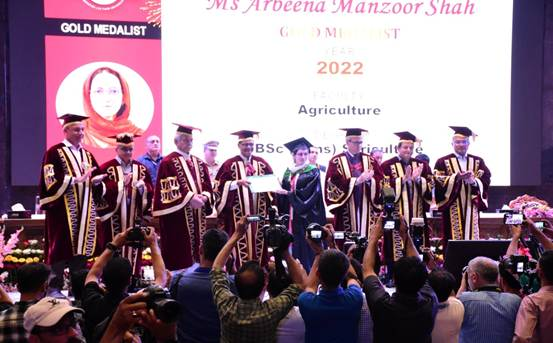Shivraj Singh Chouhan Urges Agri Innovation at SKUAST-K Convocation in Srinagar
During the convocation, degrees were conferred upon 5,250 graduating students from undergraduate, postgraduate, and doctoral programs.

- Country:
- India
Union Minister for Agriculture, Farmers’ Welfare and Rural Development, Shri Shivraj Singh Chouhan, marked the second day of his visit to Jammu & Kashmir by attending the sixth convocation ceremony of Sher-e-Kashmir University of Agricultural Sciences and Technology – Kashmir (SKUAST-K) in Srinagar. The momentous event underscored the Centre’s continued emphasis on rural empowerment, agricultural innovation, and youth engagement as core pillars of the Viksit Bharat 2047 mission.
The convocation was held in the presence of a high-profile gathering, including Lieutenant Governor Shri Manoj Sinha, who also serves as Chancellor of the University, Chief Minister Shri Omar Abdullah, Pro-Chancellor of SKUAST-K, Agriculture and Rural Development Minister Shri Javed Ahmad Dar, Deputy Chief Minister Shri Rajendra Chaudhary, Education Minister Ms. Sakina Masood, as well as vice-chancellors, professors, and senior officials from across India.
A Ceremony Celebrating Academic Excellence and National Unity
During the convocation, degrees were conferred upon 5,250 graduating students from undergraduate, postgraduate, and doctoral programs. Additionally, 150 gold medals and 445 merit certificates were awarded to students who demonstrated academic distinction and leadership potential.
Shri Chouhan commended SKUAST-K for becoming a nationally and internationally recognized agricultural institution, with students hailing from 30 Indian states and Union Territories and even from abroad. He praised the university’s contribution to building the next generation of agricultural scientists and innovators.
A Message of Unity, Empowerment, and Agricultural Renaissance
In a heartfelt address to the graduates and attendees, Shri Chouhan reflected on the emotional warmth and hospitality he experienced during his Srinagar visit. “Jammu & Kashmir is the crown jewel of India,” he declared, adding that the region’s beauty is matched only by the spirit and resilience of its people.
He recalled past appeals made by CM Omar Abdullah in NITI Aayog meetings to encourage Central ministers to visit Jammu & Kashmir and host high-level discussions. “We accepted your heartfelt invitation,” he said, confirming that an advisory committee meeting on agriculture and rural development had been conducted during his visit.
Transforming J&K into a Global Horticulture Hub
The minister highlighted the enormous potential of J&K’s fruits, vegetables, and floriculture, known for their rich flavor and vibrant color. “Kashmiri apples must become global ambassadors of Indian agriculture,” he said.
As part of this vision, the minister announced a major initiative: the establishment of a ₹150 crore Clean Plant Center under the Mission for Integrated Development of Horticulture (MIDH). This facility will ensure virus- and bacteria-free planting material, reducing dependence on imports and preventing potential crop diseases.
Shri Chouhan also spotlighted the success of the Holistic Agricultural Development Programme (HADP), stating that apple yields in some regions have increased from 10 tonnes to 60 tonnes per hectare, a six-fold jump.
India’s Agricultural Transformation Under PM Modi
Reaffirming the Centre’s commitment to farmers, Shri Chouhan credited Prime Minister Narendra Modi for leading India into an era of food security and agricultural resilience. Over the past 11 years, foodgrain production has increased by 44%, setting new records in rice, wheat, maize, soybean, and groundnut yields.
He also elaborated on the six-point strategy for transforming Indian agriculture, as outlined by the Prime Minister:
-
Increasing agricultural production
-
Reducing the cost of cultivation
-
Ensuring fair prices for produce
-
Compensating for crop losses
-
Diversifying crops and allied activities
-
Promoting natural and sustainable farming methods
Empowering Youth and Rural Startups
To the graduating students, Shri Chouhan delivered an inspiring message: “Convocation is not the end of learning but the beginning of applying knowledge for societal good.” He urged students to use practical knowledge, launch agri-tech startups, and take innovations to the grassroots.
Citing Swami Vivekananda, he reminded the youth that “Man is a storehouse of infinite strength; there is nothing he cannot achieve.” He encouraged students to dream big, set goals, and work tirelessly for the greater good.
He emphasized that agriculture remains the backbone of the Indian economy, supporting over half the nation’s population. “Agricultural produce cannot be manufactured in factories. It is born of soil, toil, and knowledge,” he said.
Outreach to Border Communities and Last-Mile Development
Shri Chouhan also shared experiences from a recent visit to border villages alongside scientists and the J&K Agriculture Minister, stressing the need to take development and scientific progress to the remotest corners of the nation.
His message was clear: Development must be inclusive, innovation-driven, and rooted in compassion. “Let your life be one of meaning, service, and purpose. Move forward with the mantra: Peace, not war; love, not hatred,” he said.
Jammu & Kashmir at the Forefront of a Viksit Bharat
In conclusion, Shri Shivraj Singh Chouhan expressed confidence that Jammu & Kashmir will play a pivotal role in building a self-reliant, globally respected India. With a strategic push in agriculture, education, innovation, and rural transformation, the region is set to become a model for inclusive national development.
He called for collective efforts between Central and State governments, academia, and youth to build a future-ready India—one that feeds the world and leads with wisdom, resilience, and unity.










